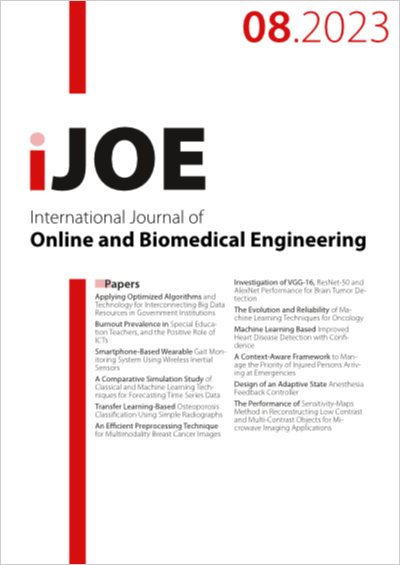An Efficient Preprocessing Technique for Multimodality Breast Cancer Images
DOI:
https://doi.org/10.3991/ijoe.v19i08.40043Keywords:
SCG , Sobel, Canny, Gabor, PSNRAbstract
On average, one in every eight women is diagnosed with breast cancer during their lifetime, and accounts for 14% of cancers in women. Since early diagnosis could improve treatment outcomes and longer survival times for patients, it is absolutely necessary to develop techniques to classify lesions within breast cancer mammograms and ultrasound images. The main goal is to determine the class of tumor present within the image, which is pivotal in diagnosing breast cancer patients. In this paper, we propose an Sobel-Canny-Gabor(SCG) model, which is a hybrid model that implements three different edge detection filters; Sobel filter, Gabor filter, and Canny filter. This model is used to enhance the appearance of the mammogram and ultrasound images, which is then fed into a classification model. Through classification, there could be a potential improvement in the results of the overall classification. Post-classification, the model is then evaluated using the metric Peak Signal-to-Noise Ratio (PSNR), which measures the quality between the original image and the compressed image.On average, one in every eight women is diagnosed with breast cancer during their lifetime, and accounts for 14% of cancers in women. Since early diagnosis could improve treatment outcomes and longer survival times for patients, it is absolutely necessary to develop techniques to classify lesions within breast cancer mammograms and ultrasound images. The main goal is to determine the class of tumor present within the image, which is pivotal in diagnosing breast cancer patients. In this paper, we propose an Sobel-Canny-Gabor(SCG) model, which is a hybrid model that implements three different edge detection filters; Sobel filter, Gabor filter, and Canny filter. This model is used to enhance the appearance of the mammogram and ultrasound images, which is then fed into a classification model. Through classification, there could be a potential improvement in the results of the overall classification. Post-classification, the model is then evaluated using the metric Peak Signal-to-Noise Ratio (PSNR), which measures the quality between the original image and the compressed image.
Downloads
Published
How to Cite
Issue
Section
License
Copyright (c) 2023 Anupama Y K, Dr.Amutha S, Dr.Ramesh Babu D R

This work is licensed under a Creative Commons Attribution 4.0 International License.


